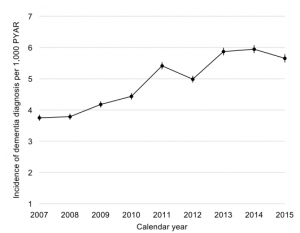Hosting a dementia workshop for health care professionals and caregivers – a reflection
By Eleanor Mason, on 6 December 2023

Alice Burnand, Associate Researcher, Centre for Ageing Population Studies (CAPS) shares her experience hosting a dementia workshop.
Introduction
On October 11th, 2023 I hosted a workshop to share results from our research project, which brought together a variety of individuals such as clinicians, caregivers, and researchers. Our research project involved evaluating the current literature on the non-pharmacological interventions to manage psychosis symptoms in dementia, such as hallucinations and delusions. I wanted to share the take-home messages of this research, to improve the quality of care that is delivered to people living with dementia. The workshop, however, was not just about sharing knowledge but also about rich interactions, meeting individuals who have unfortunately been affected by dementia-related psychosis, the exchange of ideas, and invaluable feedback about this important research topic.
The Workshop’s Concept
The workshop was titled “non-pharmacological interventions in the management of dementia-related psychosis”. It aimed to educate the audience on the symptoms and causes of psychosis in dementia, how to optimise physical health and the environment for someone, and to share the current literature to best support individuals without the need for medication. It also aimed to inform the audience of the risk of bias in research, to enable them to make informed decisions about the quality of the papers that we discussed. The aim was to empower caregivers and healthcare professionals, and to share valuable tools that can be used to support people living with dementia.
Planning and Preparation
It all began with meticulous planning and inviting a guest speaker to collaborate and join. In the months leading up to the event, I outlined my goals, determined my target audience, and designed the content to be engaging and informative. I originally wanted the workshop to be help in person, with 20 attendees, however, I quickly gained a vast amount of interest following circulation of the information, with nearly 100 people signing up asking to join. I chose to do the workshop hybrid, to make it as accessible as possible and so that everyone who wanted to join, could. For those coming in person, I chose a venue in a central London location, and ensured I provided all the necessary supplies, including printouts, drinks, and importantly, chocolate biscuits.
The Workshop Experience
Learning and content
The workshop started with educating the audience on psychosis in dementia and how to prevent it by ensuring physical health is optimised. It was led by myself and the guest speaker, Dr Stephen Orleans-Foli, who is a consultant psychiatrist working in the Cognitive Impairment and Dementia Service, West London NHS Trust. We then discussed the current research that aims to support individuals living with dementia without medication, and whether these are effective or not. Examples of these therapies include music therapy and aromatherapy and we discussed how to “trial” these. The aim was for the audience to apply the knowledge learnt in the first half to the content and the activities in the second half.
Group Discussions
After the teaching took place and in the second half of the workshop, we invited individuals to join “break-out rooms” on Zoom, and those in person were in groups sat round tables. We had 3 vignettes for groups to discuss for 5 minutes, about how they would best manage a situation, applying the knowledge they had just learnt. We then invited individuals to share their ideas and perceptions. It was incredible to see how different perspectives and life stories enriched the discussion and inspired others. An example of a vignette is below.
How would you manage?
86-year-old widow lives with her daughter. She has a 3-year history 3 of Alzheimer’s disease dementia (ADD). She is currently on Donepezil for her ADD. She spends the day looking for certain clothes in her wardrobe and leaves some of these strewn around the bedroom and lounge. She accuses her daughter of theft as some of her clothes are missing. She repeatedly calls the police on her daughter. Her daughter repeatedly challenges her mother that she has no need of her mother’s clothes as they don’t fit and not her style.
Post-Workshop Reflection
A supportive environment
It was great to have such an interactive audience and individuals who were keen to get involved to raise points of interest and ask questions. It can always be a worry when asking the audience to get involved – but we had some great feedback and interaction from the audience which I was very grateful for!
Personal and Professional Growth
As the facilitator, witnessing the resilience of caregivers and healthcare professionals as they shared personal experiences was inspiring, and the huge interest in the workshop demonstrated how dementia-related psychosis affects so many people. For me, this has reaffirmed the importance of researching this topic.
Participant Feedback
The feedback received from participants following the workshop was incredibly rewarding. Many expressed how the experience had helped shape their approach to caregiving and had provided useful information in their supportive roles for people with dementia.
Conclusion
Hosting the workshop was an experience I thoroughly enjoyed. It was great to know the work you have put into researching receives appreciation from people who are directly impacted by the condition. It has helped me to understand the need for further research in this area, and I look forward to more opportunities to contribute to research and make a difference.
If you would like a copy of the recording or the slides of the workshop, please email Alice Burnand – a.burnand@ucl.ac.uk.
Acknowledgement
This research project and workshop were funded by the School of Primary Care Research at UCL. The views expressed are those of the author(s) and not necessarily those of the NIHR or the Department of Health and Social Care.
 Close
Close





